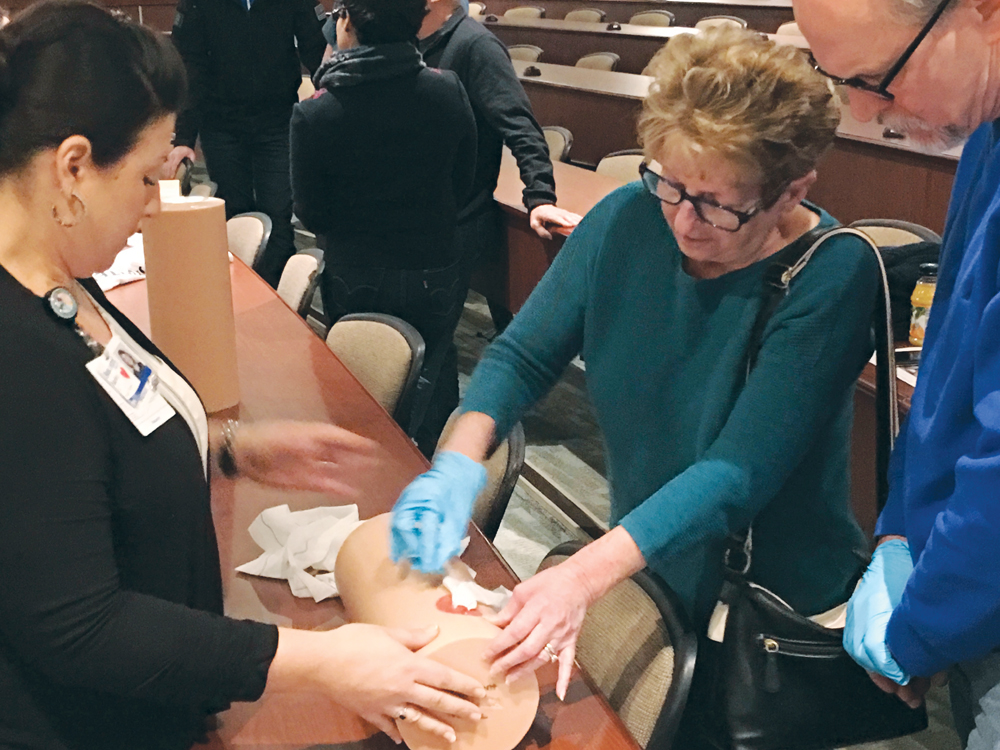Blood Warning
A spring workshop focuses on assisting victims of life-threatening injuries

With the national rise in mass shootings, Beaumont Health System hospitals have been holding “Stop the Bleed” courses to train the general public on how to treat injuries prior to the arrival of paramedics.
In these free, hour-long classes, instructors will walk individuals through essential steps for spotting and treating critical injuries. The classes are in conjunction with the national Stop the Bleed public service campaign.
Beaumont Hospital in Trenton is holding a course on April 17. “We’ll show you how to spot life-threatening bleeding, how to apply nonstop pressure to a bleeding wound, when to use a tourniquet and how to apply one, and how to pack a wound to stop bleeding,” says Trauma Program Manager Kathy Franzen, RN.
To register, call 734-642-2123. beaumont.org
Street Smarts
Street Medicine Detroit bridges the gap between health care access and homelessness
In 2011, Jonathan Wong, then a first-year medical student at Wayne State University, learned about street medicine, the now global movement pioneered by Dr. James Withers that brings medical attention directly to some of the most marginalized individuals living within a given city — the homeless population.
With a mission to serve the homeless people of Detroit, Wong and several colleagues began drafting what would become Street Medicine Detroit. By 2012, under the guidance of faculty members and neighborhood partners, a new student organization was formed.
Now, the WSU volunteer-based organization is providing quality, intensely patient-centered care for Detroit’s homeless community. Among its “do’s,” Street Medicine Detroit advises volunteers to engage the patient at their level — literally. If the patient is standing, the volunteer is expected to stand with them. If they are sitting, sit with them. Make eye contact. Street medicine meets people where they are, at shelters or on the streets, and addresses their medical concerns in an approachable, equitable manner.
Visit streetmedicinedetroit.org for more details or to find out how to volunteer or donate.
The Aftermath
Local hospitals struggle to recover from Hurricane Maria

When 155 mph winds ransacked Puerto Rico last fall, medical facilities around the country lost access to vital resources that they had long relied on the island to provide.
Puerto Rico manufactures intravenous solution bags used by 70 percent of hospitals across the U.S. Additionally, the National Drug Code Directory lists more than 1,000 drug products made there, including HIV medications, cardiovascular drugs, and antidepressants.
To preserve the current stock of resources provided by Puerto Rican manufacturers, Food and Drug Administration Commissioner Scott Gottlieb, M.D., has urged companies to submit data to extend expiration dates on products that can be safely stored for longer periods. The FDA has also approved IV saline products from additional companies such as Fresenius Kabi and Laboratorios Grifols to help increase product supply. Larger institutions use hundreds of IV solution bags a day. Beaumont Health System, with eight hospitals and numerous medical centers in southeast Michigan, estimates it uses 50,000 small-volume IV bags per month.
In the meantime, Beaumont nurses have begun giving oral medication when able and standing by a patient’s bedside to deliver medication by syringe.
|
|
|









